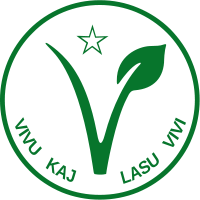Being vegetarian in Esperanto Posted by Chuck Smith on Nov 6, 2013 in Uncategorized
I still remember my first thoughts about vegetaranismo in Esperanto. I had this conversation.
Anna: Why do you eat meat?
Me: It’s too difficult to always find a vegetarian option.
Anna: That’s a stupid reason. Every Esperanto conference has a vegetarian option. Why aren’t you a vegetarian here?
Me: I never thought of that!
After that point, I’ve signed up as a vegetarian to almost every Esperanto conference I’ve attended. I came across this again while looking into the main groups, which are most likely to learn the language: traveller, geek, language lover and vegetarians. In my blog post The “Average” Esperanto speaker, I wrote the following about vegetarians and vegans:
While this is the newest addition to the tendencies of Esperanto speakers, it took me a while to figure out why this group was so prominent. Well, they are a group of idealists who also practice what they believe. Typically vegetarians support animal rights, but also support their beliefs by no longer eating meat. Vegans even more so by not eating any animal products. They think about the way the world should be and adapt their lives to do their part to help move us all toward that ideal. They also face resistance from their friends for their lifestyle in the same way Esperanto speakers encounter disbelief for their choice of language, so they need a thick skin to receive this criticism and continue on despite that.
So, last week I saw the documentary Vegucated about 3 New Yorkers who decide to go completely vegan for 6 weeks. A vegan is someone who doesn’t eat meat or any animals products (i.e. eggs, cheese, honey, etc) nor buy clothes made from animals (i.e. leather, silk, etc). I would highly recommend this film for anyone interested in the thinking that goes behind becoming vegan. It really hit home how we’re a cog in the machine that doesn’t treat animals very kindly, to put it mildly. So, in the same way that many people learn Esperanto by seeing the world in the big picture of language inequality, many Esperanto speakers use the same logic to realize that we can change the world a little with our personal decisions, whether that’s what language we learn or how we eat.
I’ve been flexitarian for a couple years now, eating meat about twice a week after watching Why I’m a Weekday Vegetarian (with Esperanto subtitles). In this talk, Hill explains how meat was eaten twice per week traditionally, so that’s also how he chooses to live. With his logic, two weekday vegetarians help animals as much as one vegetarian. So, the question was no longer am I a meat-eater or a vegetarian, or can I be something in between?
As I mentioned before, you can sign up as a vegetarian for pretty much every Esperanto conference in the world with one meeting going as far as introducing what they called the “cruel tax” to pay extra if you want to eat meat. Needless to say, that name didn’t go over too well… In any case, here is some vocabulary to help you be vegetarian or vegan in Esperanto:
Kial vi estas ĉiomanĝanto, vegetarano aŭ vegano?
Why are you an omnivore (literally: everything-eater), vegetarian or vegan?
Ĉu tio estas viando aŭ tofuo?
Is that meat or tofu?
(Remember j is pronounced like y.)
Ovoj, fromaĝo kaj mielo estas bestaj produktoj.
Eggs, cheese and honey are animal products.
Kie estas la plej proksima vegetara restoracio?
Where is the nearest vegetarian restaurant?
Do you have a special diet? Tell us about it in the comments!

Build vocabulary, practice pronunciation, and more with Transparent Language Online. Available anytime, anywhere, on any device.
About the Author: Chuck Smith
I was born in the US, but Esperanto has led me all over the world. I started teaching myself Esperanto on a whim in 2001, not knowing how it would change my life. The timing couldn’t have been better; around that same time I discovered Wikipedia in it’s very early stages and launched the Esperanto version. When I decided to backpack through Europe, I found Esperanto speakers to host me. These connections led me to the Esperanto Youth Organization in Rotterdam, where I worked for a year, using Esperanto as my primary language. Though in recent years I’ve moved on to other endeavors like iOS development, I remain deeply engrained in the Esperanto community, and love keeping you informed of the latest news. The best thing that came from learning Esperanto has been the opportunity to connect with fellow speakers around the globe, so feel free to join in the conversation with a comment! I am now the founder and CTO of the social app Amikumu.





Comments:
Eric:
I also consider myself a “flexitarian”, although without a structured approach like eating meat twice a week, but rather eating meat if that’s what I feel like eating (which all in all averages to about the same).
My experience is that I usually sign up as vegetarian in all esperanto events I attend because the food is better (and the cruel meat eaters are often not allowed to eat the vegetarian food).
Cícero Soares:
Mi ne estas vegetarano, c’ar mi kredas ke natura homa evoluado okazis dum milionoj da jaroj per c’asado kaj plukado. La klopodo s’ang’i tiun realaj’on estas relative juna – c.7000-10000j – okaze de ekapero de agrikulturo, kio tute s’ang’is la mang’manieron de la homaro, spite al g’iaj biologiaj bezonoj.
Ken Morgan:
I’m just starting learning Esperanto and am a vegan. I would be interested to know if there are vegan options at the Esperanto conferences.
Aaron:
Mi estas komencanto kaj vegana kaj vidis ankaŭ multajn vegetaranoj / vegetaĵisma manĝo en la komunumo .